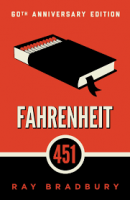 Nathan reviews Fahrenheit 451 (60th Anniversary Edition) by Ray Bradbury, Simon & Schuster Paperbacks, 2013, 249 pages
Nathan reviews Fahrenheit 451 (60th Anniversary Edition) by Ray Bradbury, Simon & Schuster Paperbacks, 2013, 249 pages
This is one book I can always return to and find something new, something different. Now, five years since the last time I read it, I feel almost like I am experiencing the entire novel for the first time. While dated in its depiction of the future, I still find it fresh and alarmingly relevant from the very first few pages on through the end. Bradbury, known for his work in science-fiction and even inspiring Stephen King, comes off as incredibly poetic, blending beautiful figurative language and vivid depictions into a bleak setting, as he allows us a glimpse into the mind of our protagonist, Guy Montag, a fireman who actually sets fires, for that is what they do in this world. Guy thinks of more than just his current moment, and this sets him apart from nearly everyone in the world except for his new neighbors. For the longest time, he, too, lived as if he were a drone, allowing a collective bigger than himself to do the mental work for him. From the very beginning, though, we see the philosophical quandaries Guy faces grow and multiply. Many of them come down to a deceptively simple choice: Accept what he has always been told or question the establishment of his world in even the slightest way.
The events of the novel take place in the seemingly not-so-distant future. One that is just different enough to feel foreign yet real enough to be troubling. Technology and efficiency became the standard at the cost of compassion and understanding of the human condition, instead treating critical health care as something for a couple “handymen” to fix, smoking cigarettes the entire time. Even a pending declaration of war (again) is of no concern to many characters, and it is often dismissed as quickly as it is mentioned. The world has devolved into absolutes in every aspect, seeing the world and everyone and everything in it as black or white. Society policed itself and ensured “uniformity” and “equality” in some bizarre way through the prohibition and removal of books.
Even before the novel begins, Guy had been harboring a spark (there truly does not feel to be a better word here) within him–and his home. Once he meets Clarisse, he has the breath, the wind, that soon starts to spread embers into his everyday dealings in work and relationships. Unfortunately, to some regard, and ironically, this fireman could not control the blaze that would soon erupt and consume what he once knew. If the source of the inferno had to be traced back to a singular cause of ignition, that would be the following question: “Do you ever read any of the books you burn?” This fitting question to a fireman whose job it is to burn books embodies and foreshadows the change, the transformation that is to come. Though fire burns in a spectacular blend of colors, Guy soon begins to understand and better see the grey areas of the world in better focus because of this blossoming fire within himself. He becomes the rarity it is his job to remove. Rare because society has ensured the mind of every citizen “drinks less and less” through conditioning and condensing material. The firemen think they do protect the happiness and well-being of citizens by saving the innocents from dissenting thoughts.
As the story progresses, so does Guy’s curiosity (and guilt). He begins asking “Why?” instead of the “How?” he and countless others are expected to ask about everyday life. Though he was not innocent to begin with, Guy seals his fate when he steals a book from a home he was there to burn. He practically commits the act unconsciously; though he is aware he is doing it, he did not intend to do it. Almost immediately, the guilt and worry take a physical toll on him. Guy soon confesses to his wife the sins of hiding away stolen books before fleeing to a type of literary resistance coalition.
Like Montag’s situation, I feel Bradbury uses his prose to challenge the reader. While it is not a call to action to a grand crusade or campaign to upend the establishment of society, Bradbury’s urge for the reader is still quite noble. Bradbury conveys to his readers to ask questions. To push back. To learn for one’s own sake. To even… read. In this sense, Fahrenheit 451 stays incredibly relevant in the age of “fake news,” “alternative facts,” and “misinformation.” Because of those things, Fahrenheit 451 can be seen as an indicator that we should try to question further, to discover more independently, and to think more openly, freely.
Bradbury proposes another challenge along the same line as the first to readers–and society for that matter–through Guy and his wife, Mildred. People need to move out of their comfort zone at times. As Guy says to Mildred, “We need to be really bothered once in a while. How long is it since you were really bothered? About something important, about something real?” Mildred, like so many others in the world of Fahrenheit 451 and even our own world, is content to sit and consume different forms of entertainment and never think for herself, not actually caring of the consequences of any action. She never bothers herself with anything outside of her (three, soon to be four) video walls in the parlor which display practically nothing more than visual and emotional sedatives. Guy is yearning to be more than the world has in mind for him. He is shedding the skin of the former docile and unthinking version of himself and becoming someone truly new and different.
In the end, what destroys also offers opportunities for new growth. The same is true for Guy as he has to burn his own home, and that fire helps to free him from his responsibilities to this society. Guy himself burns his past life so that he can now grow into a new one. He ran from that life; he escaped that world. Then he would run to a fire, one that was “not burning, it was warming.” This fire comforts him as everything he once knew is metaphorically and literally destroyed at the end.






